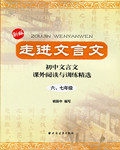题目内容
What ______ in the middle of the film?
[ ]
A. was happen
B. does happen
C. did happen
D. happened
B. does happen
C. did happen
D. happened
D

练习册系列答案
 字词句篇与同步作文达标系列答案
字词句篇与同步作文达标系列答案 走进文言文系列答案
走进文言文系列答案
相关题目
At a nation’s saddest moment, its greatest heroes are born.
On September 11th, 2001, many police officers and government officials in America worked day and night to save lives from the big fire at the World Trade Centre. And in Japan, after the serious earthquake, a group of workers showed their courage.
The earthquake on March 11th made Fukushima Nuclear Power Plant(福岛核电站) turn off and stop its protective cooling systems. And later, a fire broke out. Workers were told that the plant’s radiation(辐射) could be harmful to human health. Hundreds of workers left the plant quickly. However, a group of workers decided to fight against the fire and the damage, though they knew it could cause very serious health problems. There were 50 workers in all, so they were also named the "Fukushima 50". The workers worked in shifts(轮班).
People knew little about the workers, who were mainly experts (专家) with the skills to control the situation. One woman said that her father had volunteered to stay there. "I heard that he volunteered even though he would retire(退休) in just half a year and my eyes were filled with tears. I am really proud of him. And I pray for his safe return.
【小题1】The passage mainly tells us
【小题2】 Fukushima Nuclear Power Plant was turned off because
【小题3】 workers stayed in Fukushima Nuclear Power Plant after the earthquake.
【小题4】Which of the following is TRUE?
health.
【小题5】 The writer thinks
On September 11th, 2001, many police officers and government officials in America worked day and night to save lives from the big fire at the World Trade Centre. And in Japan, after the serious earthquake, a group of workers showed their courage.
The earthquake on March 11th made Fukushima Nuclear Power Plant(福岛核电站) turn off and stop its protective cooling systems. And later, a fire broke out. Workers were told that the plant’s radiation(辐射) could be harmful to human health. Hundreds of workers left the plant quickly. However, a group of workers decided to fight against the fire and the damage, though they knew it could cause very serious health problems. There were 50 workers in all, so they were also named the "Fukushima 50". The workers worked in shifts(轮班).
People knew little about the workers, who were mainly experts (专家) with the skills to control the situation. One woman said that her father had volunteered to stay there. "I heard that he volunteered even though he would retire(退休) in just half a year and my eyes were filled with tears. I am really proud of him. And I pray for his safe return.
【小题1】The passage mainly tells us
| A.what happened in America on September 1l th, 2001 |
| B."Fukushima 50" stayed in the nuclear power plant bravely |
| C.who saved many lives from the big fire at the World Trade Centre |
| D.what Japanese government did after the nuclear power plant was turned off |
| A.there were no heroes there | B.many workers left the plant |
| C.it was destroyed by a big fire | D.the earthquake damaged it heavily |
| A.11 | B.50 | C.100 | D.150 |
| A.The woman learned something about her father. |
| B.A woman’s father who had retired from work still stayed there. |
| C.Little was known about the workers when the passage was written. |
| D.The workers didn’t know staying in the nuclear plant was harmful to their |
【小题5】 The writer thinks
| A.American police officers were very strong |
| B.the nuclear radiation would do no damage to humans |
| C.all the workers who stayed in the plant should return quickly |
| D.all the workers who stayed in the plant are great heroes |
